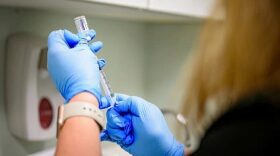-
After a surge of flu just after Christmas, flu numbers have chilled out. Meanwhile, flu vaccination numbers continue to drop.
-
Calling it the “Health Care Medical Freedom Act,” a House Republican on Monday filed a bill that says health-care providers could not “discriminate” against patients based on vaccination status and seeks to add disclosure requirements when children get vaccinated.
-
FL pediatricians recall childhood suffering before vaccines; Ladapo’s plan to strike mandates stallsBefore Hib vaccination, about 20,000 children younger than five developed severe Hib disease each year in the United States, and about 1,000 died.
-
“The ripple effect of removing vaccine entry requirements would affect all of us, not just those with children in school,” said FCAAP President Rana Alissa.
-
The congresswoman's remarks came same day the state's top medical official announced plans to eliminate vaccine mandates.
-
U.S. Rep. Debbie Wasserman Schultz (FL-25) called for Florida's surgeon general Dr. Joseph Ladapo, a Gov. DeSantis ally, to resign or be terminated over his refusal to declare a public health emergency over the Broward County outbreak.
-
A group of University of Florida medical school faculty members challenged controversial guidance by state Surgeon General Joseph Ladapo on COVID-19 vaccinations, but a university official said Wednesday the guidance is outside the scope of Ladapo’s work with the school.
-
Last school year marked a more than 10-year low for Florida’s kindergarten and seventh-grade students completing all doses of required immunizations, according to a recent report from the state Department of Health. The required shots — which do not include COVID-19 vaccinations — are designed to protect against diseases including tetanus, diphtheria, measles, mumps, rubella, influenza B, hepatitis B and polio.
-
Because polio has been vanishingly rare in the U.S. for nearly a half-century, doctors may not consider it when diagnosing patients with typical symptoms. Here are the signs and science behind the disease.
-
The FDA has authorized Pfizer and Moderna vaccines for children ages 6 months to 4 years old. The CDC is recommending those vaccines.
-
The Special Olympics have begun in Florida without an originally planned vaccine mandate in place that would have blocked some athletes from competing.
-
COVID-19 vaccinations for children younger than 5 could start right after the Juneteenth holiday.
Play Live Radio
Next Up:
0:00
0:00
Available On Air Stations










